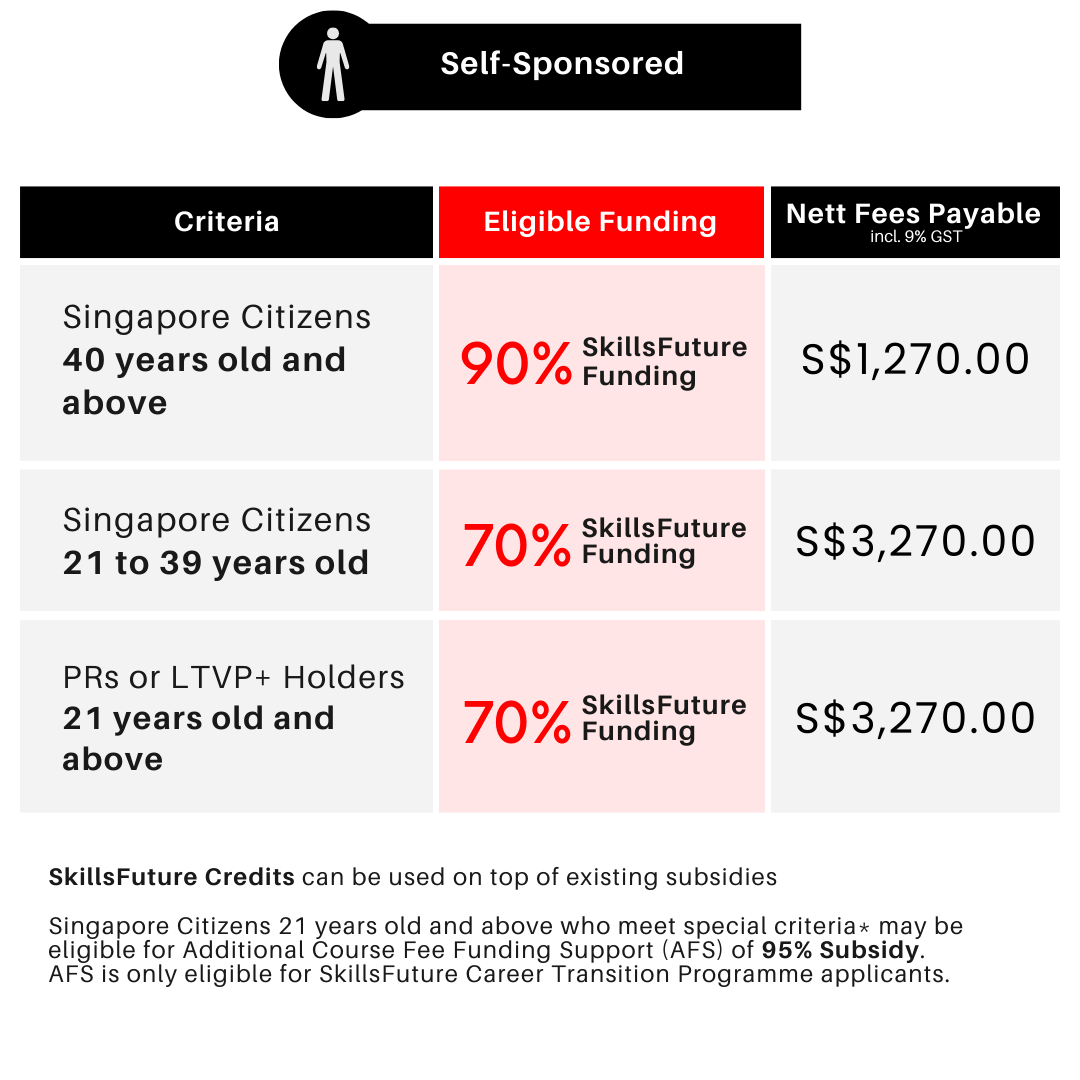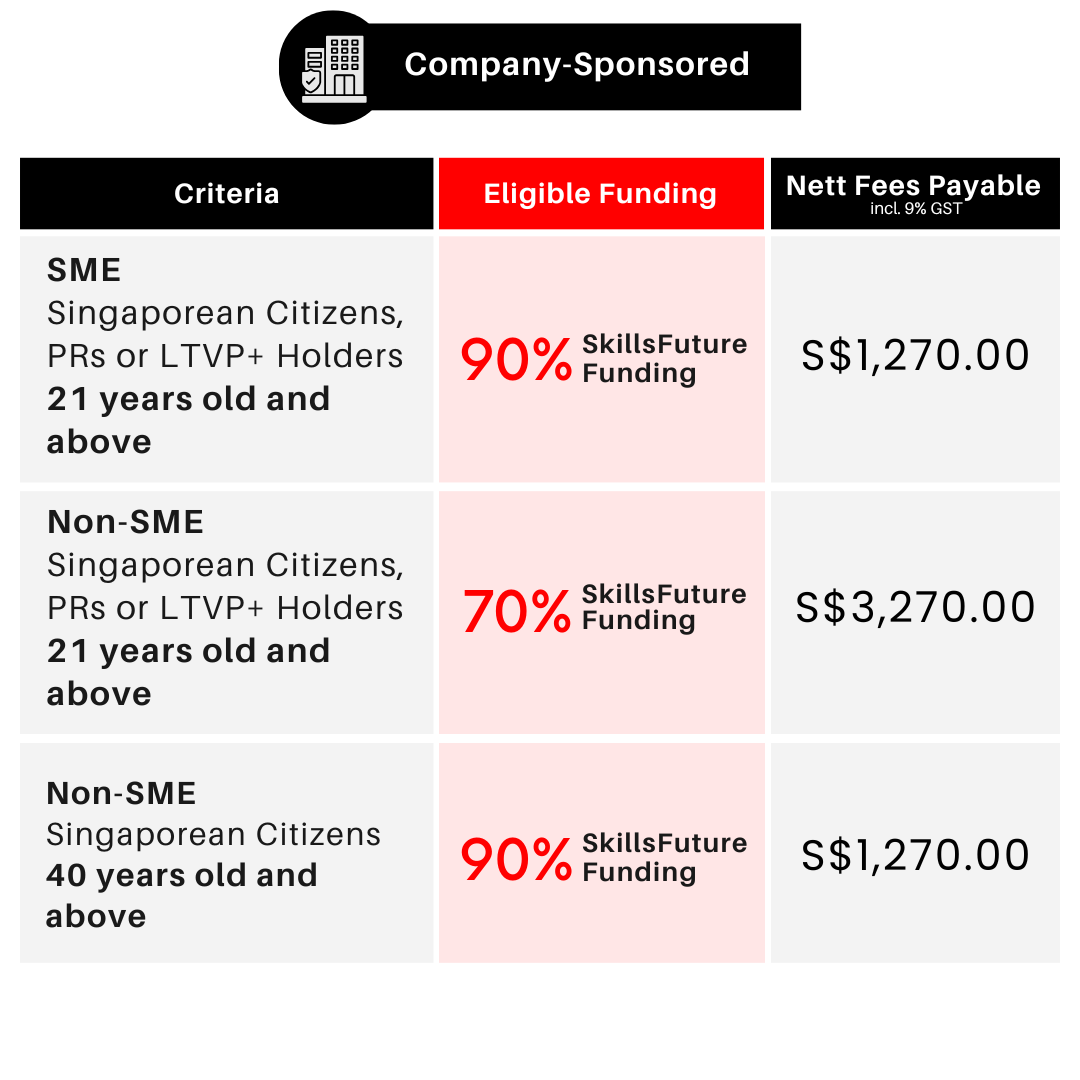The Advanced Certificate in IT Infrastructure and Operations (IIO) programme is a comprehensive IT training programme designed to equip participants with advanced skills and knowledge in managing and optimising IT infrastructure.
Through seven structured modules, participants will delve into areas such as hardware and software troubleshooting, network administration, server management, cloud computing, cybersecurity, and emerging technologies.
The programme incorporates hands-on learning experiences, practical applications, and a capstone project to ensure participants gain practical expertise and are prepared to tackle real-world IT challenges. With a focus on collaborative problem-solving and the latest industry trends, the Advanced Certificate in IIO programme prepares participants for roles in IT operations, infrastructure management, and cybersecurity.
Enrolment Requirement:
To apply for the Advanced Certificate in Infocomm Technology (Infrastructure and Operations) Programme, you should possess one of the following qualifications or meet one of these criteria:
Basic computer literacy and fundamental understanding of IT Infrastructure and Operations concepts are required.
All Applicants will go through pre-enrolment screening process.
Application Documents Required:
These documents will be reviewed as part of the screening process.
Assessment Method:
Written assessment (i.e., Short Questions & Answers & Case study) & Individual Project Assignment.
 Training led by practitioners with experience in the industry
Training led by practitioners with experience in the industry
 Comprehensive, up-to-date curriculum and courseware
Comprehensive, up-to-date curriculum and courseware
 Real-world hands-on projects
Real-world hands-on projects
 Career advisory and resources support
Career advisory and resources support
Embark on an immersive journey into the realm of IT problem-solving with our comprehensive course designed for those who seek to master the art of troubleshooting complex hardware and software issues. This course offers a robust curriculum that equips you with the necessary knowledge and skills to diagnose, prioritise, and resolve intricate technical problems.
The assessment consists of a written assessment and a practical performance assessment to demonstrate competencies in the Learning Units of this module.
By the end of this course, you will demonstrate the ability to tackle any hardware or software issue with confidence, apply critical problem-solving skills in collaborative settings, and communicate your findings and solutions effectively, setting you apart as a competent trouble-shooter in the field of information technology.
This comprehensive course in Advanced Network Administration is designed for individuals seeking to deepen their expertise in the field of network management. With a focus on equipping learners with state-of-the-art skills in network design, configuration, security, and troubleshooting, this course offers an unparalleled opportunity to master complex network environments. Through hands-on training and theoretical learning, learners will not only enhance their capability to manage and optimise network infrastructures but also ensure their preparedness to address and mitigate security vulnerabilities.
The assessment consists of a written assessment and a practical performance assessment to demonstrate competencies in the Learning Units of this module.
By the end of the module, you will possess comprehensive knowledge and hands-on skills in computer hardware and peripherals, enabling them to understand, assemble, upgrade, troubleshoot, and optimise PCs effectively, including mastering BIOS settings for enhanced system performance and resolving boot-related issues proficiently.
This course equips learners with essential skills for managing server environments, covering server installation, virtualization, Active Directory, DNS/DHCP, storage management, remote access, virtual machines, and disaster recovery, with hands-on experience in deploying and managing Windows Server systems.
ractices to enhance your IT capabilities for career growth in this comprehensive module.
A written assessment and practical performance that assesses trainees’ capability to diagnose and resolve complex technical issues.
By the end of the module, you will demonstrate proficiency in managing modern server environments, including selecting and installing server hardware, setting up Active Directory and DNS, and integrating essential server components such as DHCP, thereby facilitating efficient network infrastructure management.
In the rapidly evolving digital landscape, cloud computing has emerged as a cornerstone technology that enables businesses and individuals to access computing resources on-demand, scale efficiently, and drive innovation. This course offers an in-depth exploration into the world of cloud computing, designed to equip learners with a robust understanding of its fundamental concepts, architectures, and key characteristics.
A written assessment and practical performance that assesses trainees’ capability to perform cloud computing.ently addressing and resolving network issues.
By the end of the module, you will be proficient in designing, implementing, and managing cloud computing components, including selecting appropriate service models and deployment models, configuring virtual networks and storage solutions, setting up virtual machines, and troubleshooting common networking issues using tools such as Network Watcher and Azure Monitor.
This dynamic and comprehensive training programme is designed for individuals passionate about cybersecurity and ethical hacking. With a curriculum that balances theoretical knowledge with practical skills, this course aims to equip learners with advanced expertise in cybersecurity practices, ethical hacking techniques, incident response, forensic analysis, and the hands-on use of platforms like Hack The Box. Participants will emerge as proficient cybersecurity professionals capable of protecting organisations against sophisticated cyber threats.
The assessment for this course includes a written test and a practical assessment to evaluate candidates’ capability to perform cybersecurity and ethical hacking.
By the end of the module, you will possess advanced knowledge and skills in cybersecurity concepts, penetration testing methodologies, incident response, and digital forensics, enabling them to apply appropriate methodologies effectively in real-world scenarios.
This course provides an in-depth exploration of emerging technologies like AI, Blockchain, IoT, Cloud Computing, and more, while also examining the digital workplace’s evolution post-pandemic. Participants will gain insights into key tech trends, strategies for implementation, and potential risks, with interactive lectures, case studies, and workshops ensuring both theoretical and practical understanding.
The assessment is a written assessment.
By the end of the module, you will possess a comprehensive understanding of key emerging technologies shaping the digital workplace, enabling them to analyse market trends, identify pitfalls, and propose transformative strategies leveraging technologies such as AI, Blockchain, IoT, and Cloud Computing to optimise enterprise operations.
Real-world IT Project module comprises five learning units that aim to equip the trainees with the essential skills and knowledge to design, develop, and deliver a significant project in one of two key areas: Penetration Testing Campaign or Cloud Computing Solution.
I had a great experience at ASK Training in Tanjong Pagar. The environment is very conducive for learning and the staff are exceptionally nice and helpful. The trainers are knowledgeable and share their real-world experiences, making the training sessions very insightful. Highly recommended!
The training environment is good, with friendly and helpful staff. The trainers are very engaging and knowledgeable practitioners in their own fields of study.




In Singapore, an Advanced Certificate is typically a higher qualification than a regular Certificate. If you’re considering the Advanced Certificate in Infocomm Technology (Infrastructure & Operations), you likely already have a basic understanding of IT. The Advanced Certificate involves more in-depth study and a higher level of difficulty.
The course duration is 29.5 days (236 hours). The average duration to complete this course is 6 months.
This course builds on your existing IT knowledge and equips you with advanced troubleshooting skills for hardware, software, and networks. You’ll also learn to manage Microsoft Server environments, including Active Directory, storage solutions, and virtualisation with Hyper-V.
This Advanced Certificate is ideal for IT professionals in Singapore looking to advance their careers in infrastructure and operations. It’s also suitable for individuals with an existing foundation in IT who want to specialise in server administration and network troubleshooting.
Yes, the course includes hands-on activities and a Capstone Project at the end of this course. This is to solidify your understanding of the concepts and allow you to practice your newly acquired skills in real-world scenarios.
We have multiple intakes available. Please check our course schedule by clicking on the “Intake Dates” tab above for the latest schedules or if you require more assistance, drop us a message and our course consultants will be happy to help.
Yes, you may be eligible for subsidies to help you offset the cost of the Advanced Certificate in Infocomm Technology (Infrastructure & Operations) course with up to 95% SkillsFuture funding.
For more details on the courses and available funding, check out the course fees and subsidies section above, see our Funding Information page or get in touch with our team for further clarification.
The SkillsFuture Career Transition Programme (SCTP) supports mid-career individuals in acquiring industry-relevant skills to improve employability and pivot to new sectors or job roles.
You can choose to study part-time or full-time, depending on what suits you best, and the programme lasts between 3 to 12 months.
This ensures individuals like you have the opportunity to upskill or re-skill while effectively preparing for successful career transitions.
For more information on SkillsFuture Career Transition Programmes (SCTP), visit the MySkillsFuture website.
Yes, the SkillsFuture Career Transition Programme (SCTP) is a government initiative in Singapore designed to assist mid-career individuals in acquiring new skills and knowledge to facilitate a career transition.
This programme is geared towards individuals who wish to switch industries or occupations due to changes in the job market, technological advancements, or personal career goals.
| Advanced Certificate in Infocomm Technology (Infrastrutcure & Operations) | |
|---|---|
| Fee Excluding GST | $10,000.00 |
| For Singaporeans > 21 (Excl. GST) | $3,000.00 |
| For Singaporeans > 40 (Excl. GST) | $1,000.00 |
| For Foreigners (Excl. GST) | $10,000.00 |

Graduate with a recognised certificate

Experience real-world application through hands-on projects with real project partners

Learning materials are vetted by our Dean to ensure relevant and up-to-date curriculum

Gain one-on-one coaching by our mentors when completing your capstone project

Personalised career advise and support to assist in your job search

Trainers are hand-picked industry experts who are certified trainers, offering real-world insights


Bachelor's of Computing in Information System National University of Singapore


Bachelor's of Computing in Information System National University of Singapore


Bachelor's of Computing in Information System National University of Singapore


Bachelor's of Computing in Information System National University of Singapore
If you’re thinking about taking your next step but are still unsure of which programme suits your needs best, our programme consultants are available to guide you through your learning journey.
Speak to us now to find out more!

